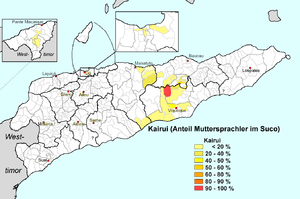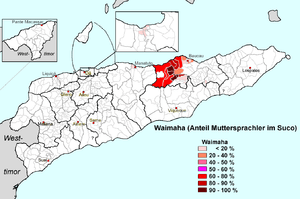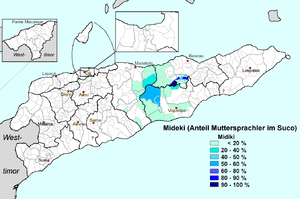Waimoa language
| Waimoa | |
|---|---|
| Region | Northeast East Timor |
Native speakers | 18,467[1] (2010 censuses)[2] |
|
Austronesian ?
| |
| Dialects |
Waimoa
Kairui
Midiki
|
| Language codes | |
| ISO 639-3 |
Either: wmh – Waimoa krd – Kairui-Midiki |
| Glottolog |
waim1252 (Waima'a)[3]kair1265 (Kairui-Midiki)[4] |
|
Distribution of Waimaha mother-tongue speakers in East Timor | |
|
Distribution of Mideki  Distribution of Kairui | |
Waimoa or Waima'a is a spoken by about 18,467 (2010 census)[1] people in northeast East Timor. Waimoa proper is reported to be mutually intelligible with neighboring Kairui and Midiki, with 5,000 speakers total.
The classification of Waimoa is unclear. Structurally, it is Malayo-Polynesian. However, its vocabulary is largely Papuan, similar to that of Makasae. Although generally classified as Austronesian languages or dialects that have been largely relexified under the influence of a language related to Makasae, it is possible that Waimoa, Kairui, and Midiki are instead Papuan languages related to Makasae which have been influenced by Austronesian.
Phonology
Waimoa has aspirated consonants, ash is one of only two (possibly) Austronesian languages reported to have a set of ejective stops, the other being Yapese:
| Bilabial | Coronal | Velar | Glottal | |
|---|---|---|---|---|
| Voiceless unaspirated | p | t | k | ʔ |
| Voiceless aspirated | pʰ | tʰ | kʰ | |
| Voiceless ejective | pʼ | tʼ | kʼ | |
| Voiced plain | b | d | ɡ |
However, these sounds have also been described as post-glottalized.
There is also vowel harmony.
See also
- Kawaimina
References
- ↑ 1.0 1.1 Direcção Nacional de Estatística: Population Distribution by Administrative Areas Volume 2 English (Census 2010; PDF-Datei; 21,53 MB)
- ↑ Waimoa at Ethnologue (18th ed., 2015)
Kairui-Midiki at Ethnologue (18th ed., 2015) - ↑ Nordhoff, Sebastian; Hammarström, Harald; Forkel, Robert; Haspelmath, Martin, eds. (2013). "Waima'a". Glottolog. Leipzig: Max Planck Institute for Evolutionary Anthropology.
- ↑ Nordhoff, Sebastian; Hammarström, Harald; Forkel, Robert; Haspelmath, Martin, eds. (2013). "Kairui-Midiki". Glottolog. Leipzig: Max Planck Institute for Evolutionary Anthropology.
- Hajek, John; Bowden, John (June 2002). "A Phonological Oddity in the Austronesian Area: Ejectives in Waimoa". Oceanic Linguistics 41 (1): 222–224. doi:10.1353/ol.2002.0021.

